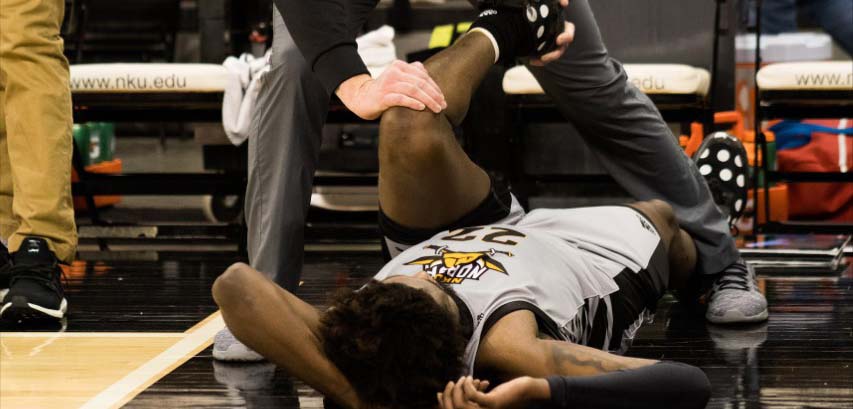As basketball season winds down into the frenzied fun finale of March Madness, the athletic trainers at St. Elizabeth Healthcare remind student-athletes about the importance of injury prevention year-round.
“We see the whole gambit of sports-related injuries in basketball, but the most common are ankle and knee injuries,” says Nathan Ameen, Assistant Athletic Trainer at St. Elizabeth Healthcare and Northern Kentucky University Men’s Basketball team.
The most common basketball injuries can also take a long time to heal – sometimes, these injuries can even be season-enders. Frequently seen basketball injuries include:
- Cartilage damage.
- Cruciate ligament sprains, including ACL.
- Meniscus tear.
- Tendon injuries.
If you’re injured while playing basketball, it’s essential to seek medical attention instead of just “playing through it.” Sure, it might help you finish the game – but playing on an injured knee or ankle can cause long-term damage and add to your recovery time.
When Do Basketball Injuries Happen?
Basketball injuries can happen anytime, whether you’re shooting around in the backyard or playing for your college team.
Athletic trainers see the most significant uptick in injuries about two weeks after pre-season practice begins. That’s when the training load increases at the high school and college levels. Athletes – especially first-year students – have a higher likelihood of injury as they transition from off-season workouts to more hours on the court.
Mid-season injuries are less predictable. However, at the end of the season, athletic trainers see many wear-and-tear type injuries, especially in juniors and seniors.
The St. Elizabeth Sports Medicine team also sees a lot of basketball injuries from “weekend warriors.” Injuries can happen during pick-up games between friends, in adult basketball leagues, and even playing outside with your kids.
Can I Prevent a Basketball Injury?
There is no surefire way to prevent a basketball injury. However, the more strength training and conditioning you do, the more stable your knees, ankles and shoulder joints will be while you’re shooting hoops.
The team of athletic trainers at St. Elizabeth Healthcare is here to help. You might not realize it, but injury prevention is an athletic trainer’s most significant responsibility.
“Injuries in basketball do occur, but having a trainer is an athlete’s best ally when trying to return to the sport that they love to play,” says Ameen. “We always look out for the athlete’s mental and physical health and wellbeing.”
Athletic trainers work daily with athletes to help prevent injury. These include:
- Bracing.
- Injury education with the athletes.
- Nutrition consultation.
- Recovery after events.
- Pre-rehabilitation.
- Stretching.
- Taping.
Trainers typically have office hours and attend practices and games to triage any injuries. They aim to get you back on the court, pain-free, as soon as you’re ready.
Multi-sport Athletes Have an Advantage
Did you know that multi-sport athletes tend to perform better and have fewer injuries than athletes specializing in one year-round sports experience? Playing various sports helps you become a better all-around athlete and decreases your chance of missing training due to injury, burnout or decreased athletic performance.
However, while being a multi-sport athlete benefits high school students, it’s a rarity once you reach college.
“At the collegiate level, it becomes much harder to play multiple sports,” says Ameen. “That’s where strategic cross-training, rest and recovery become the main factors of increased performance and a decreased chance of injury.”
No matter what your sports journey looks like, make sure you’re tapping into the knowledge and expertise of your school’s athletic trainer.
Connect With the St. Elizabeth Sports Medicine Team
The St. Elizabeth Sports Medicine program provides highly skilled athletic trainers to numerous local high school and collegiate athletic programs. Our athletic trainers offer dedicated care to local athletes, getting them back into the game and helping prevent future injuries.
For more information or to schedule a consultation appointment with our Sports Medicine Team, please visit St. Elizabeth Sports Medicine.

